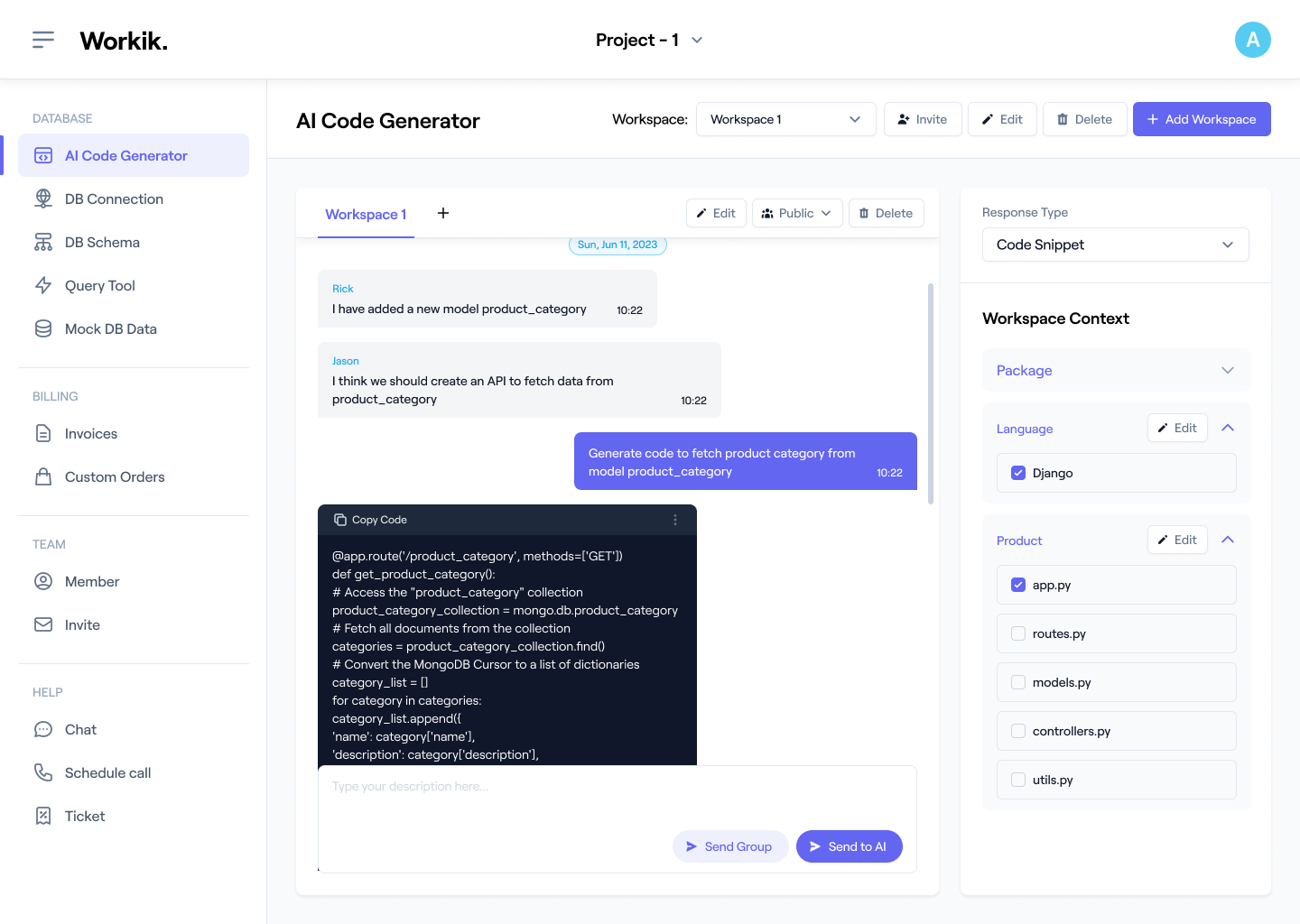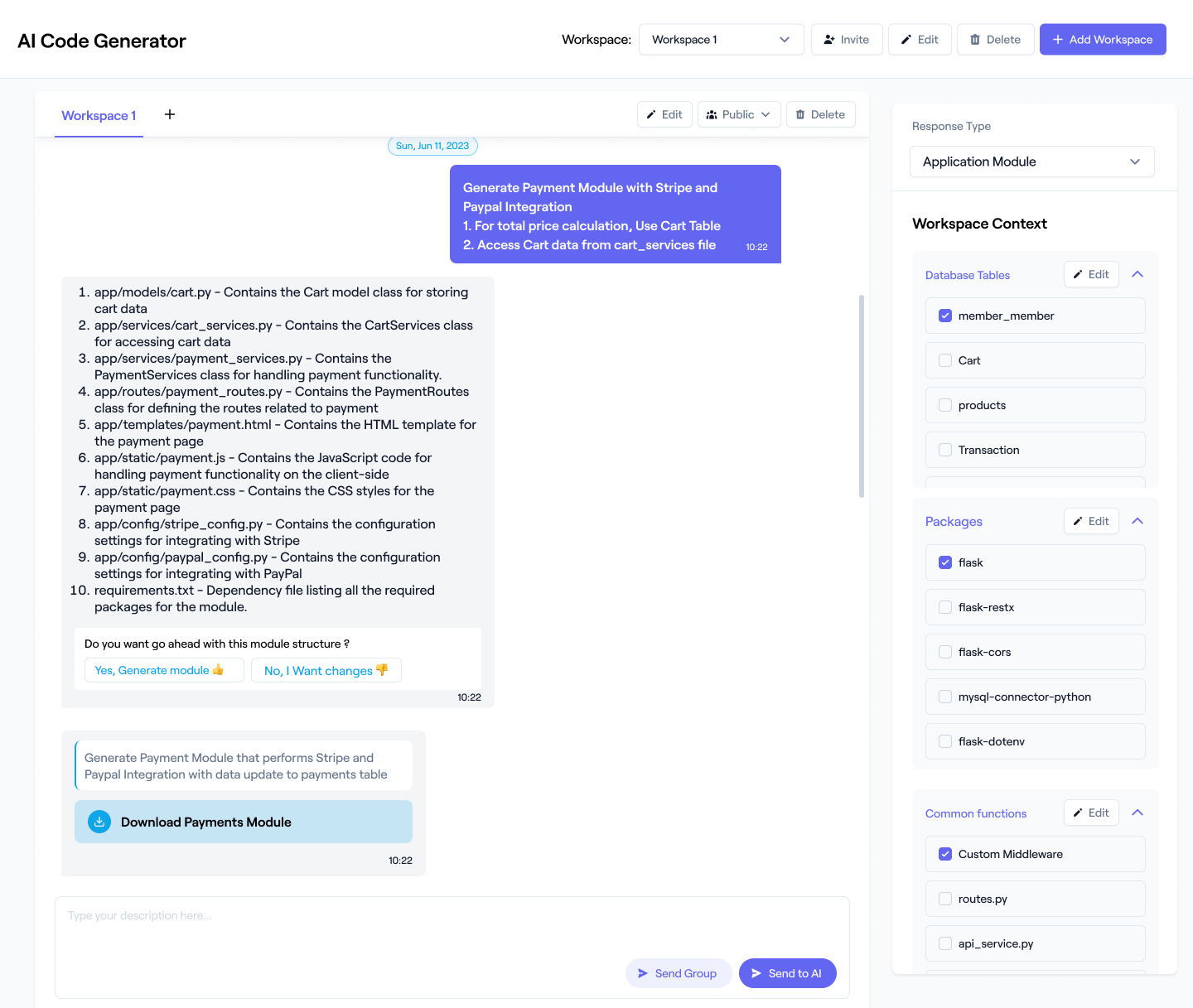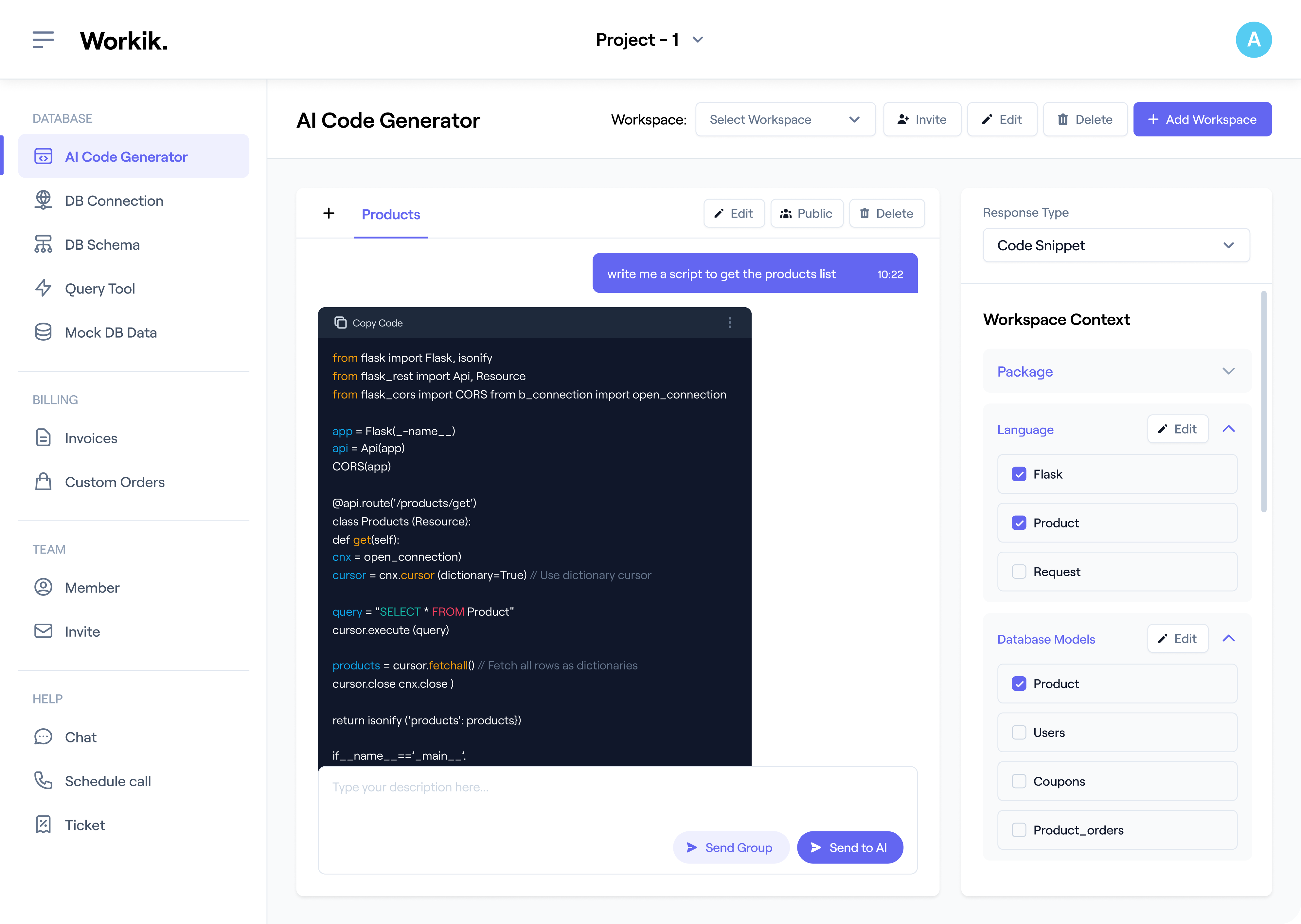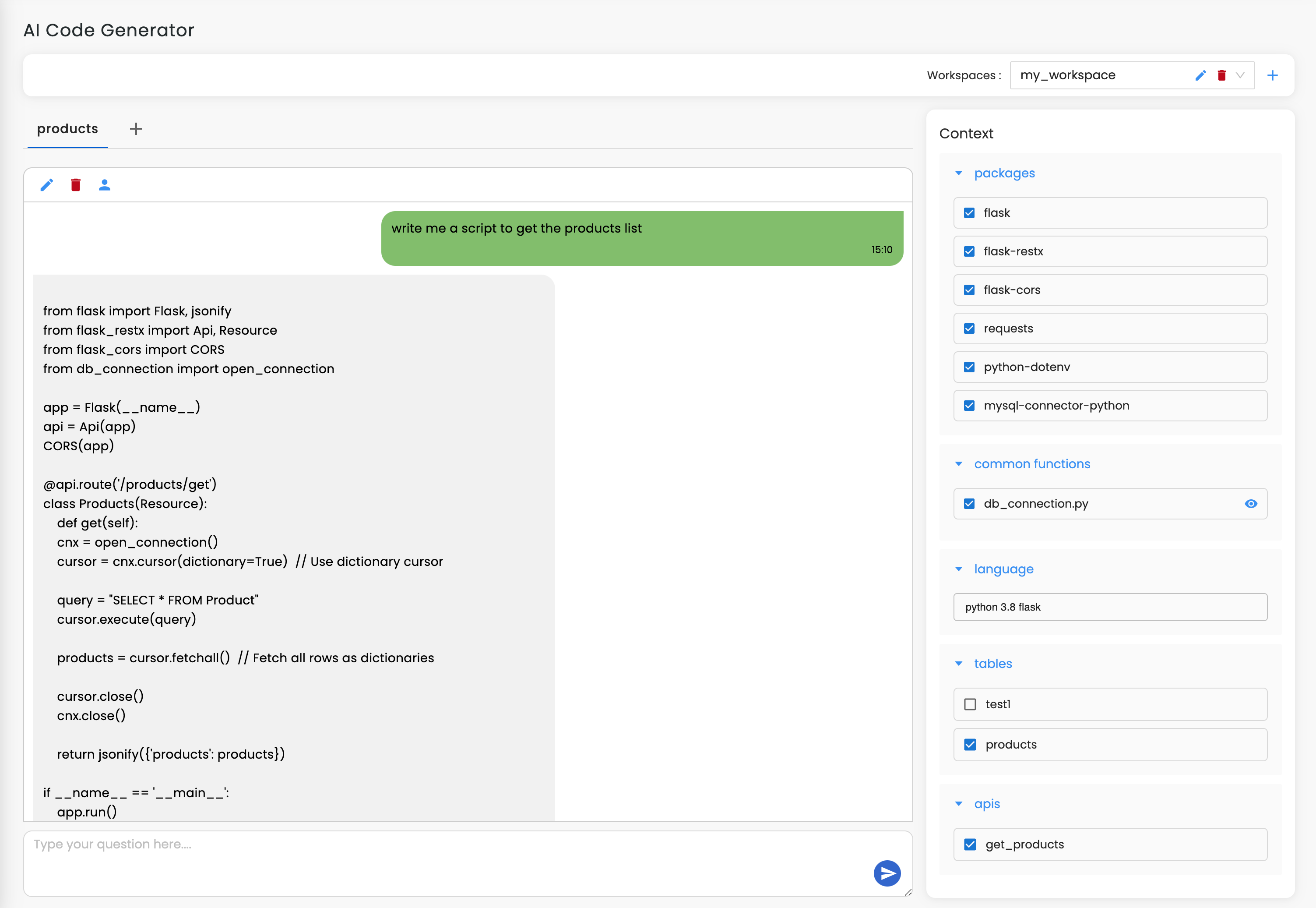Join our community to see how developers are using Workik AI everyday.
Supported AI models on Workik
GPT 5.2 Codex, GPT 5.2, GPT 5.1 Codex, GPT 5.1, GPT 5 Mini, GPT 5
Gemini 3.1 Pro, Gemini 3 Flash, Gemini 3 Pro, Gemini 2.5 Pro
Claude 4.6 sonnet, Claude 4.5 Sonnet, Claude 4.5 Haiku, Claude 4 Sonnet
Deepseek Reasoner, Deepseek Chat, Deepseek R1(High)
Grok 4.1 Fast, Grok 4, Grok Code Fast 1
Models availability might vary based on your plan on Workik
Features

Generate Test Cases Easily
Quickly generate unit test cases with AI for any Python function or module.

Craft Multi-Version Python Tests
AI generates unit tests that verify code functionality across various Python versions.

Prevent Code Regressions
Generate tests with AI to guard against regressions, ensuring that updates don't reintroduce old bugs.

Create Mock Objects
AI simplifies the creation of mock objects for testing complex interactions with external services or databases.
How it works
Signing up for Workik is fast and free. You can either enter your details manually or use your Google account.
Personalize AI’s output by adding any of your relevant context. You can integrate with GitHub, GitLab, or Bitbucket to import your Python code directly, specify Python testing frameworks, set test parameters, include any relevant dependencies & more.
Create accurate and efficient Python test cases with AI. Handle edge cases like null values, extreme sizes, and unexpected data types, ensuring thorough coverage and accuracy.
Collaborate with your team members and ensure consistent testing practices. You can also run AI-Powered automated pipelines for python unit testing.


Expand


Expand


Expand


Expand


Expand


Expand


Expand


TESTIMONIALS
Real Stories, Real Results with Workik
Workik’s python unit test generator provides thorough coverage, enhancing the robustness of our system architecture.

Marcus Yi
CTO
Workik AI has helped us improve code quality and accelerate delivery times. It's a complete game-changer for our team.

Olivia Grant
Lead QA Engineer
Workik's precision in generating Python unit tests is remarkable. It identifies code nuances that even experienced testers may overlook!

David Clarkson
Software Tester
What types of context can I set in Workik for tailored Python unit test generation?


Workik allows various context setting options to tailor the output according to your project. You can specify:
- The Python version (e.g., Python 3.8)
- The testing framework (e.g., unittest, pytest, nose)
- The API endpoints that the code interacts with
- Configuration files (e.g., .env, config.py)
- Integrate with GitHub, GitLab, and Bitbucket repositories
What are some popular use cases for Workik’s Python unit test case generator?


Popular use cases for the Python unit test case generator include but are not limited to:
- Creating parameterized test cases to cover a wide range of input scenarios
- Analyzing code to identify missing test cases and suggest new ones
- Refactoring existing test cases to improve readability and maintainability
- Suggesting edge cases and boundary tests based on function signatures and logic
Can I use Python Unit Test Case Generator for both frontend and backend?


Yes, Workik supports both frontend and backend testing. It generates unit tests for backend components like APIs, databases, and business logic, as well as frontend elements like user interfaces and client-side logic, ensuring comprehensive coverage and high code quality.
Is Workik suitable for testing Python applications across different operating systems?


Yes, Workik AI can generate unit tests that are compatible with multiple operating systems. This capability ensures that Python applications behave consistently across various environments, from Windows to Linux to macOS.
Can Workik integrate with CI/CD pipelines for automated testing?


Absolutely! Workik seamlessly integrates with your CI/CD tools to trigger unit test generation and execution. This integration helps ensure that every build is automatically tested, reducing manual overhead and speeding up release cycles.
Can't find answer you are looking for?
Request question

Request question
Please fill in the form below to submit your question.
Create Python Tests Now

Python unit test case question & answer
Python unit test cases are a fundamental part of the software testing process, designed to test individual units or components of a Python program to ensure they work as intended. A "unit" refers to the smallest part of an application that can be tested independently, such as a function, method, or class. They help in verifying the functionality of individual components, detecting regressions, and ensuring that changes do not introduce new bugs.
Popular frameworks and libraries used with Python Unit Test Case are:
1. unittest:
Built-in Python library for creating and running unit tests.
2. pytest:
Powerful testing framework that supports fixtures, parameterized testing, and plugins.
3. nose2:
Successor to nose, extends unittest to make testing easier.
4. doctest:
Tests embedded in documentation to ensure examples work as intended.
5. mock:
Library for mocking and patching objects during tests, part of unittest.mock in Python 3.
Popular use cases of Python Unit Test Cases include:
1. Function Testing:
Verify the functionality of individual functions and methods.
2. Class Testing:
Test the behavior and interactions of classes and their methods.
3. Integration Testing:
Ensure different pieces of the code work together as expected.
4. Regression Testing:
Run tests to detect regressions in functionality after changes.
5. Mocking Dependencies:
Isolate units of code by mocking external dependencies.
Career opportunities and technical roles available for professionals in Python Unit Testing include Software Developer, QA Engineer, Test Automation Engineer, DevOps Engineer, Data Scientist, and more.
Workik AI provides broad Python Unit Testing assistance, which includes:
1. Test Case Generation:
Produces Python unit test cases for functions, classes, and modules.
2. Debugging:
Identifies and fixes issues in test cases with intelligent suggestions.
3. Optimization:
Recommends best practices for writing efficient and maintainable unit tests.
4. Integration:
Assists in integrating unit tests with CI/CD pipelines.
5. Mocking and Patching:
Provides solutions for mocking and patching dependencies during tests.
Explore more on Workik
Get in touch
Don't miss any updates of our product.
© Workik Inc. 2026 All rights reserved.

